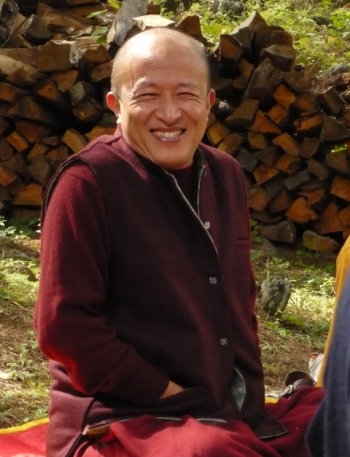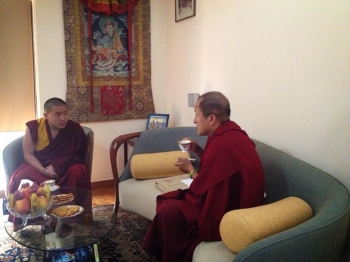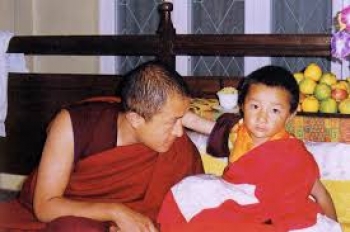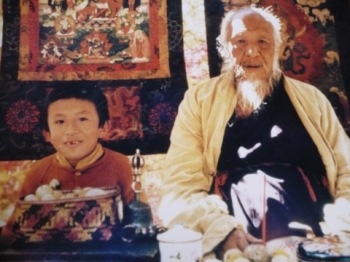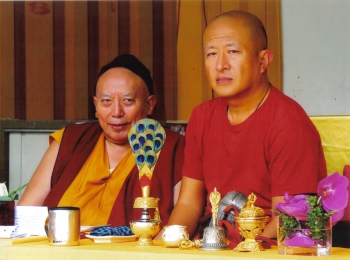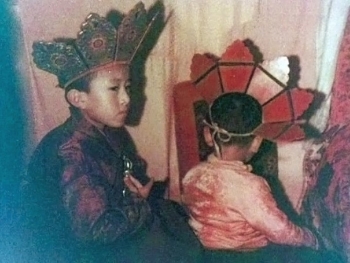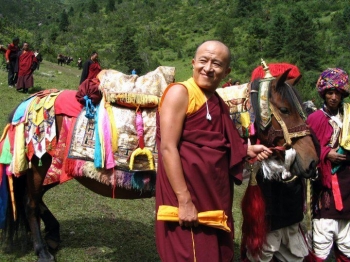Dzongsar Khyentse Rinpoche is a well-known teacher in the Vajrayana tradition of Buddhism. Born in Bhutan and now based in Bir in Himachal Pradesh, India, he gives teachings all over the world. His projects include Siddhartha’s Intent, which organizes, distributes, and archives his teachings; Khyentse Foundation, which provides the financial support necessary to fulfill his aspirations; 84000, which oversees the translation of the Word of the Buddha into modern languages; Lotus Outreach, which directs a wide range of projects to help refugees; and most recently The Lhomon Society, which promotes sustainable development in Bhutan through education. Frances McDonald recently caught up with him in Bali.
Frances McDonald: You recently gave a talk in Malaysia on modern education. Could you recap your views here?
Dzongsar Khyentse Rinpoche: At the end of the day, education is brainwashing. Brainwashing is inevitable. We human beings love doing that. We are already brainwashed—we don’t know otherwise. So since we are going to brainwash anyway, it’s good to brainwash with good motivation and so that we can be kind, harmonious, and also decent. Becoming decent human beings seems to be not so much in the modern education agenda because, as we all know, modern education seems to be so much about what we can have. Human beings are defined by what we have, like cars and houses. And then modern education is also so much geared towards getting a job. There are very few schools that teach you anything other than what will benefit you in getting a job.
FM: In the previous talk, you mentioned that it’s important to teach children that they have a mind. Could you say more about how to do that and what you mean by mind in that context?
DKR: Well, I think just tell the kids, “Hey, look, there’s something called ‘mind’—we are not like a machine. What you think, others don’t think; what you think, others can’t control; what others think, you can’t control. In fact, what you think, you can’t control most of the time. Mind gets jealous, mind gets angry, others also get jealous, others also get angry.” I think this is very important for kids to know.
FM: Is it correct that you’re planning to start an experimental school in Bir? What kind of things do you plan to teach there?
DKR: I was, but I’ve so many other things to do that it just never materializes. But the idea is to have these principles. Anyone who goes to that school may not necessarily get a good job! The idea is to promote the value of being human, which can be through teaching kids how to share, where the water comes from, the definition of profit . . . that profit can be lots of things—walking in a forest could be considered as profit, it’s not necessarily money in the pocket. Having good fun, profit. I think the definition of profit, basically.
FM: And that would be at primary and secondary level?
DKR: All, in principle, but we will of course have to adapt to the world. And I think the attitude of learning things like mathematics, politics, economics, will be to help the world. In other words, it’s like when you get trained to be a children’s teacher, you have to learn children’s mind. You have to learn how to play. It’s a useless thing, but if you want to be a children’s teacher, you have to learn that. We have to learn economics because that’s the game we have to play. Our mission is to save the earth, save the world, and to do that we need to play these games, so yeah, you can say it’s different kinds of arrogance, but we have to have that kind of strategy.
FM: How about teaching children that everything is just a “label”?
DKR: Yes, like that.
FM: What about the Dharma school you were planning to start in Australia?
DKR: It didn’t materialize. It’s so difficult because non-traditional Buddhists are scarce and scattered about. Traditional Buddhists are more into doing traditional things, like building temples. They still are not really managing to see the importance of building a children’s school.
FM: What do you think about teaching mindfulness to children?
DKR: Very good.
